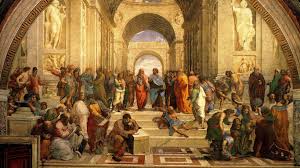renaissance
英 [rɪ'neɪsəns]
美 ['rɛnəsɑns]
CET6 TEM4 IELTS 考 研 TOEFL
1. re- "again" + naiss- + -ance.
2. => reborn, be born again.
renaissance 文艺复兴来自古法语 renaissance,重生,再生,来自拉丁语 renasci,重生,再生,来自 re-,再,重新,nasci, 生育,出生,来自 PIE*gene,生育,词源同 natal,nascent,gene.引申词义文艺复兴。
- renaissance
- renaissance: see native
- Renaissance (n.)
- "great period of revival of classical-based art and learning in Europe that began in the fourteenth century," 1840, from French renaissance des lettres, from Old French renaissance, literally "rebirth," usually in a spiritual sense, from renastre "grow anew" (of plants), "be reborn" (Modern French renaître), from Vulgar Latin *renascere, from Latin renasci "be born again, rise again, reappear, be renewed," from re- "again" (see re-) + nasci "be born" (Old Latin gnasci; see genus).
An earlier term for it was revival of learning (1785). In general usage, with a lower-case r-, "a revival" of anything that has long been in decay or disuse (especially of learning, literature, art), it is attested from 1872. Renaissance man is first recorded 1906.
- 1. His bristling determination has become a symbol of England's renaissance.
- 他精力旺盛,坚毅顽强,已经成为英格兰文艺复兴的一个象征。
来自柯林斯例句
- 2. They gathered to protest against the renaissance of the extreme right.
- 他们聚集起来抗议极右势力的复活。
来自柯林斯例句
- 3. Popular art is experiencing a renaissance.
- 通俗艺术正在复兴。
来自柯林斯例句
- 4. to experience a renaissance
- 经历复兴
来自《权威词典》
- 5. The Renaissance was an epoch of unparalleled cultural achievement.
- 文艺复兴是一个文化上取得空前成就的时代.
来自《现代汉英综合大词典》
[ renaissance 造句 ]
